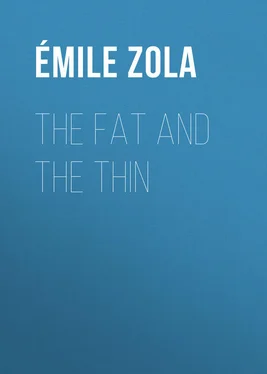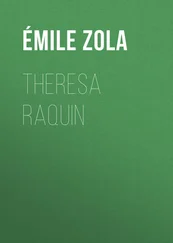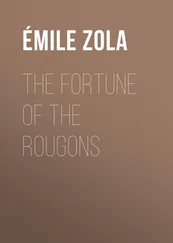Émile Zola - The Fat and the Thin
Здесь есть возможность читать онлайн «Émile Zola - The Fat and the Thin» — ознакомительный отрывок электронной книги совершенно бесплатно, а после прочтения отрывка купить полную версию. В некоторых случаях можно слушать аудио, скачать через торрент в формате fb2 и присутствует краткое содержание. Жанр: literature_19, foreign_antique, foreign_prose, на английском языке. Описание произведения, (предисловие) а так же отзывы посетителей доступны на портале библиотеки ЛибКат.
- Название:The Fat and the Thin
- Автор:
- Жанр:
- Год:неизвестен
- ISBN:нет данных
- Рейтинг книги:3 / 5. Голосов: 1
-
Избранное:Добавить в избранное
- Отзывы:
-
Ваша оценка:
- 60
- 1
- 2
- 3
- 4
- 5
The Fat and the Thin: краткое содержание, описание и аннотация
Предлагаем к чтению аннотацию, описание, краткое содержание или предисловие (зависит от того, что написал сам автор книги «The Fat and the Thin»). Если вы не нашли необходимую информацию о книге — напишите в комментариях, мы постараемся отыскать её.
The Fat and the Thin — читать онлайн ознакомительный отрывок
Ниже представлен текст книги, разбитый по страницам. Система сохранения места последней прочитанной страницы, позволяет с удобством читать онлайн бесплатно книгу «The Fat and the Thin», без необходимости каждый раз заново искать на чём Вы остановились. Поставьте закладку, и сможете в любой момент перейти на страницу, на которой закончили чтение.
Интервал:
Закладка:
His next whim was to be a locksmith; but this calling he found too fatiguing. In a couple of years he tried more than ten different trades. Florent opined that he acted rightly, that it was wrong to take up a calling one did not like. However, Quenu’s fine eagerness to work for his living strained the resources of the little establishment very seriously. Since he had begun flitting from one workshop to another there had been a constant succession of fresh expenses; money had gone in new clothes, in meals taken away from home, and in the payment of footings among fellow workmen. Florent’s salary of eighteen hundred francs was no longer sufficient, and he was obliged to take a couple of pupils in the evenings. For eight years he had continued to wear the same old coat.
However, the two brothers had made a friend. One side of the house in which they lived overlooked the Rue Saint Jacques, where there was a large poultry-roasting establishment 5 5 These rotisseries, now all but extinct, were at one time a particular feature of the Parisian provision trade. I can myself recollect several akin to the one described by M. Zola. I suspect that they largely owed their origin to the form and dimensions of the ordinary Parisian kitchen stove, which did not enable people to roast poultry at home in a convenient way. In the old French cuisine, moreover, roast joints of meat were virtually unknown; roasting was almost entirely confined to chickens, geese, turkeys, pheasants, etc.; and among the middle classes people largely bought their poultry already cooked of the rotisseur , or else confided it to him for the purpose of roasting, in the same way as our poorer classes still send their joints to the baker’s. Roasting was also long looked upon in France as a very delicate art. Brillat-Savarin, in his famous Physiologie du Gout , lays down the dictum that “A man may become a cook, but is born a rotisseur .” – Translator.
kept by a worthy man called Gavard, whose wife was dying from consumption amidst an atmosphere redolent of plump fowls. When Florent returned home too late to cook a scrap of meat, he was in the habit of laying out a dozen sous or so on a small portion of turkey or goose at this shop. Such days were feast days. Gavard in time grew interested in this tall, scraggy customer, learned his history, and invited Quenu into his shop. Before long the young fellow was constantly to be found there. As soon as his brother left the house he came downstairs and installed himself at the rear of the roasting shop, quite enraptured with the four huge spits which turned with a gentle sound in front of the tall bright flames.
The broad copper bands of the fireplace glistened brightly, the poultry steamed, the fat bubbled melodiously in the dripping-pan, and the spits seemed to talk amongst themselves and to address kindly words to Quenu, who, with a long ladle, devoutly basted the golden breasts of the fat geese and turkeys. He would stay there for hours, quite crimson in the dancing glow of the flames, and laughing vaguely, with a somewhat stupid expression, at the birds roasting in front of him. Indeed, he did not awake from this kind of trance until the geese and turkeys were unspitted. They were placed on dishes, the spits emerged from their carcasses smoking hot, and a rich gravy flowed from either end and filled the shop with a penetrating odour. Then the lad, who, standing up, had eagerly followed every phase of the dishing, would clap his hands and begin to talk to the birds, telling them that they were very nice, and would be eaten up, and that the cats would have nothing but their bones. And he would give a start of delight whenever Gavard handed him a slice of bread, which he forthwith put into the dripping-pan that it might soak and toast there for half an hour.
It was in this shop, no doubt, that Quenu’s love of cookery took its birth. Later on, when he had tried all sorts of crafts, he returned, as though driven by fate, to the spits and the poultry and the savoury gravy which induces one to lick one’s fingers. At first he was afraid of vexing his brother, who was a small eater and spoke of good fare with the disdain of a man who is ignorant of it; but afterwards, on seeing that Florent listened to him when he explained the preparation of some very elaborate dish, he confessed his desires and presently found a situation at a large restaurant. From that time forward the life of the two brothers was settled. They continued to live in the room in the Rue Royer Collard, whither they returned every evening; the one glowing and radiant from his hot fire, the other with the depressed countenance of a shabby, impecunious teacher. Florent still wore his old black coat, as he sat absorbed in correcting his pupils’ exercises; while Quenu, to put himself more at ease, donned his white apron, cap, and jacket, and, flitting about in front of the stove, amused himself by baking some dainty in the oven. Sometimes they smiled at seeing themselves thus attired, the one all in black, the other all in white. These different garbs, one bright and the other sombre, seemed to make the big room half gay and half mournful. Never, however, was there so much harmony in a household marked by such dissimilarity. Though the elder brother grew thinner and thinner, consumed by the ardent temperament which he had inherited from his Provencal father, and the younger one waxed fatter and fatter like a true son of Normandy, they loved each other in the brotherhood they derived from their mother – a mother who had been all devotion.
They had a relation in Paris, a brother of their mother’s, one Gradelle, who was in business as a pork butcher in the Rue Pirouette, near the central markets. He was a fat, hard-hearted, miserly fellow, and received his nephews as though they were starving paupers the first time they paid him a visit. They seldom went to see him afterwards. On his nameday Quenu would take him a bunch of flowers, and receive a half-franc piece in return for it. Florent’s proud and sensitive nature suffered keenly when Gradelle scrutinised his shabby clothes with the anxious, suspicious glance of a miser apprehending a request for a dinner, or the loan of a five-franc piece. One day, however, it occurred to Florent in all artlessness to ask his uncle to change a hundred-franc note for him, and after this the pork butcher showed less alarm at sight of the lads, as he called them. Still, their friendship got no further than these infrequent visits.
These years were like a long, sweet, sad dream to Florent. As they passed he tasted to the full all the bitter joys of self-sacrifice. At home, in the big room, life was all love and tenderness; but out in the world, amidst the humiliations inflicted on him by his pupils, and the rough jostling of the streets, he felt himself yielding to wicked thoughts. His slain ambitions embittered him. It was long before he could bring himself to bow to his fate, and accept with equanimity the painful lot of a poor, plain, commonplace man. At last, to guard against the temptations of wickedness, he plunged into ideal goodness, and sought refuge in a self-created sphere of absolute truth and justice. It was then that he became a republican, entering into the republican idea even as heart-broken girls enter a convent. And not finding a republic where sufficient peace and kindliness prevailed to lull his troubles to sleep, he created one for himself. He took no pleasure in books. All the blackened paper amidst which he lived spoke of evil-smelling class-rooms, of pellets of paper chewed by unruly schoolboys, of long, profitless hours of torture. Besides, books only suggested to him a spirit of mutiny and pride, whereas it was of peace and oblivion that he felt most need. To lull and soothe himself with the ideal imaginings, to dream that he was perfectly happy, and that all the world would likewise become so, to erect in his brain the republican city in which he would fain have lived, such now became his recreation, the task, again and again renewed, of all his leisure hours. He no longer read any books beyond those which his duties compelled him to peruse; he preferred to tramp along the Rue Saint Jacques as far as the outer boulevards, occasionally going yet a greater distance and returning by the Barriere d’Italie; and all along the road, with his eyes on the Quartier Mouffetard spread out at his feet, he would devise reforms of great moral and humanitarian scope, such as he thought would change that city of suffering into an abode of bliss. During the turmoil of February 1848, when Paris was stained with blood he became quite heartbroken, and rushed from one to another of the public clubs demanding that the blood which had been shed should find atonement in “the fraternal embrace of all republicans throughout the world.” He became one of those enthusiastic orators who preached revolution as a new religion, full of gentleness and salvation. The terrible days of December 1851, the days of the Coup d’Etat, were required to wean him from his doctrines of universal love. He was then without arms; allowed himself to be captured like a sheep, and was treated as though he were a wolf. He awoke from his sermon on universal brotherhood to find himself starving on the cold stones of a casemate at Bicetre.
Читать дальшеИнтервал:
Закладка:
Похожие книги на «The Fat and the Thin»
Представляем Вашему вниманию похожие книги на «The Fat and the Thin» списком для выбора. Мы отобрали схожую по названию и смыслу литературу в надежде предоставить читателям больше вариантов отыскать новые, интересные, ещё непрочитанные произведения.
Обсуждение, отзывы о книге «The Fat and the Thin» и просто собственные мнения читателей. Оставьте ваши комментарии, напишите, что Вы думаете о произведении, его смысле или главных героях. Укажите что конкретно понравилось, а что нет, и почему Вы так считаете.












